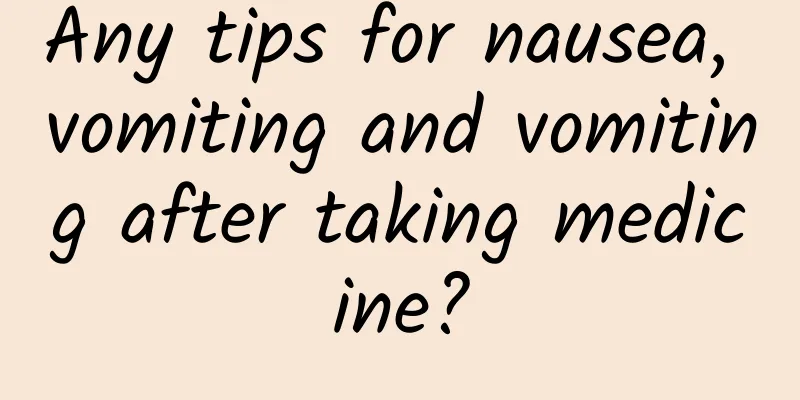Any tips for nausea, vomiting and vomiting after taking medicine?

|
Most medicines are irritating to the stomach. Some people experience nausea, vomiting and other symptoms after taking the medicine. This phenomenon is a side effect of taking the medicine. There is no other discomfort in the body. At this time, you can take the medicine within half an hour after a meal and observe first. Some people may experience nausea and vomiting after taking the medicine due to stomach problems, such as gastritis. This phenomenon requires timely examination and treatment in the hospital. Any drugs that are irritating to the gastric mucosa , such as indomethacin (Indomethacin), phenylbutazone, ammonium chloride, aspirin (acetylsalicylic acid), ferrous sulfate, etc. Taking it after meals can reduce irritation to the gastric mucosa. Among them, ammonium chloride tablets need to be dissolved in a small amount of warm water before taking, which can prevent nausea and vomiting reactions. Even the usual doses of aspirin can cause upper abdominal discomfort, or even nausea, vomiting, and other reactions. If the dosage is large (more than 3 grams per day), gastric bleeding that is not easily noticed by people may occur, or even severe bleeding, and occasionally iron deficiency anemia may occur. If the patient already has multiple mucosal erosions, gastric and duodenal ulcers, vitamin C deficiency, or takes aspirin before or after drinking, it is more likely to induce or aggravate bleeding, so aspirin is generally not suitable for use. If the condition requires, aspirin can be chewed together with the antacid compound aluminum hydroxide (Weishuping), calcium carbonate, aluminum hydroxide, etc. after meals and taken at the same time to reduce side effects. You can also take acetaminophen (paracetamol) to improve the blood circulation of the gastric mucosa, promote the division of the gastric mucosal epithelium, and reduce the damaging effects of aspirin on the gastrointestinal tract. If used in large quantities over a long period of time, it is advisable to use enteric-coated aspirin tablets so that they can pass through the stomach safely and intact, reach the intestines, be disintegrated, absorbed, and exert their therapeutic effects. Vitamin drugs have a good protective effect on the gastrointestinal mucosa. For example, vitamin A can reduce the irritation of indomethacin to the digestive tract; vitamin B complex or dry yeast tablets can counteract the gastrointestinal reactions of furazolidone (Furazolidone); vitamin K can promote the synthesis of prothrombin and prevent and treat gastrointestinal bleeding caused by drugs such as aspirin; vitamin C and ferrous sulfate combined can not only promote the absorption of iron preparations, which is beneficial for the treatment of anemia, but also reduce the irritation of iron preparations to the gastrointestinal tract. When using drugs such as erythromycin, nitrofurantoin, and sodium para-aminosalicylate, if they are used together with sodium bicarbonate (baking soda), it can effectively avoid their irritation to the gastrointestinal tract, and can also accelerate dissolution and absorption and improve efficacy. Anti-tumor drugs can almost always cause anorexia, nausea, and vomiting. This is caused by drug stimulation of nerve centers. It usually occurs within 1-2 hours after medication and can last for several hours. Therefore, taking antiemetics (metoclopramide, metoclopramide) before taking the medicine and antacids (sodium bicarbonate) before meals, as well as avoiding spicy, greasy and odorous foods, can reduce side effects. Most Chinese herbal decoctions are bitter and difficult to swallow , and can easily cause nausea and vomiting. You can drink it frequently and swallow it slowly, or you can drink a little ginger juice first and then take the decoction, or add one or two spoons of ginger juice to the medicine (ginger has an antiemetic effect), all of which have obvious effects. It can be seen from this that gastrointestinal reactions can be alleviated or eliminated by improving the method of taking medicine or choosing appropriate dosage forms, or using it in combination with other medicines. |
<<: What are the medicines for clearing stomach fire in children?
>>: What medicine is effective for stomach cramps?
Recommend
What is the reason for pain when pressing the lower abdomen
There are many reasons for lower abdominal pain. ...
Treatment of rheumatism and rheumatoid arthritis
Rheumatoid arthritis is actually a common joint d...
What to do if a child swallows a glass bead
If a child swallows glass beads, you can continue...
What are the benefits of nano steam room
Many friends like to go to nano-steaming rooms fo...
What causes frequent colds?
With the changes in one's physical constituti...
The difference between night sweats and sleep sweating
Many people sweat while sleeping. In addition to ...
How are children born?
In daily life, we often encounter children asking...
What to eat during chemotherapy for lung cancer is better for recovery
Many friends know that chemotherapy is very harmf...
Plaster allergy, redness, itching and swelling
Allergy is a common skin disease, and plaster all...
What should I do if I can't sleep the next day?
Some people are more sensitive. If they have impo...
Can I eat onions if I have gastric ulcer? I shouldn't eat spicy food.
There are many foods that patients with gastric u...
What is lupus disease
No matter who you are, you should pay attention t...
Can I get amino acid injection if I am weak?
When you are physically weak, it is beneficial to...
What to do if you sprain your ligaments during splits?
In modern society, people like to do some physica...
Chin bone cracking
Many people know that the main framework of our b...









